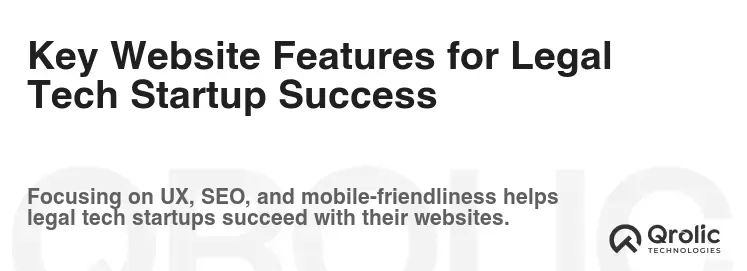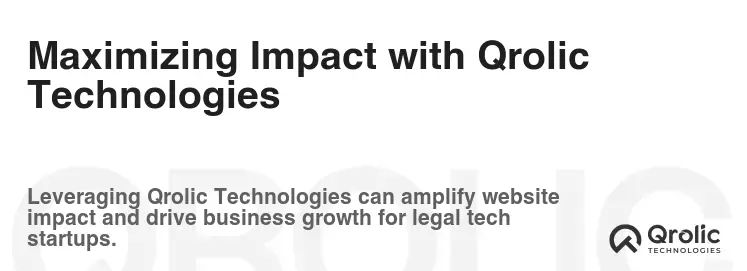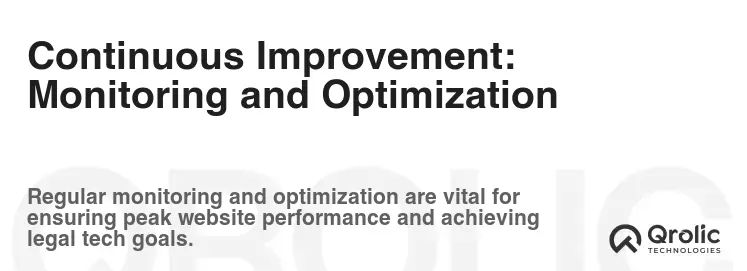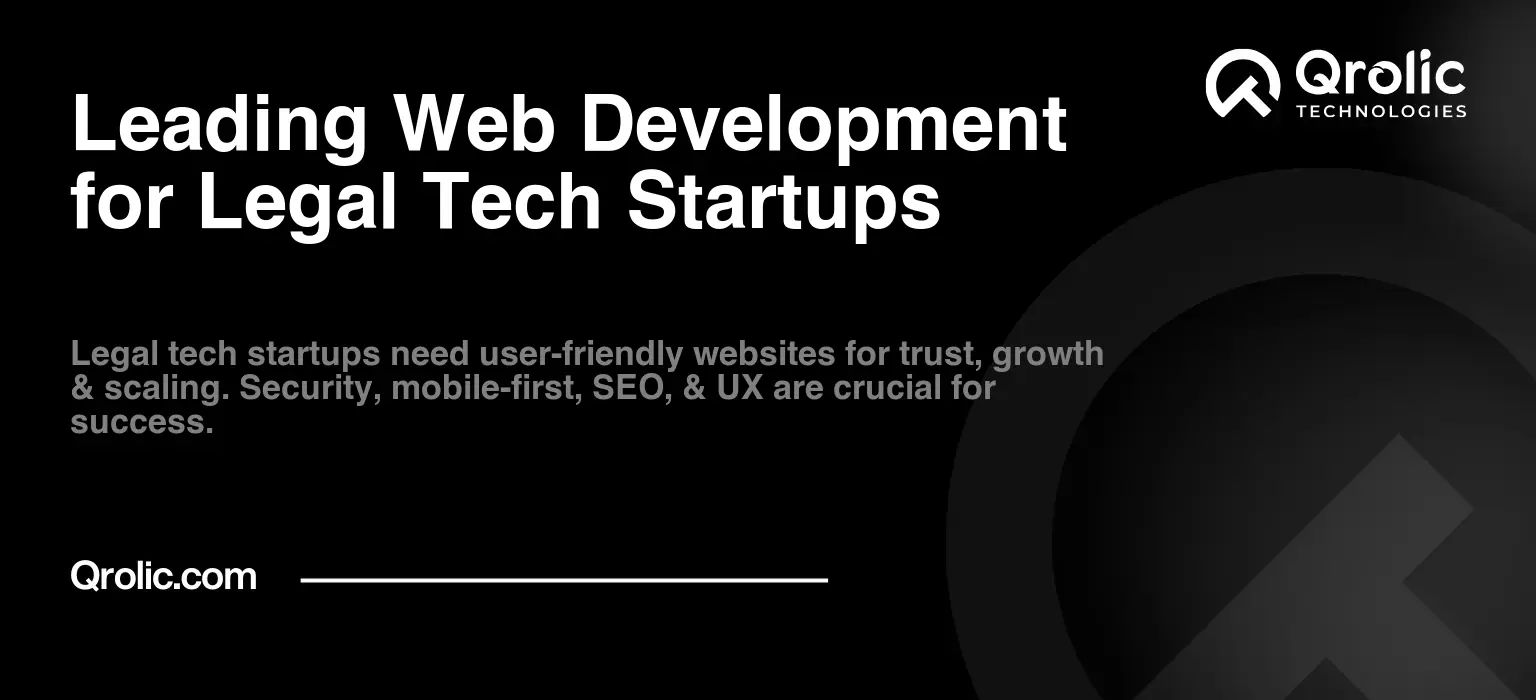Quick Summary:
- Your website is essential for legal tech success.
- Showcase clear value, product demos, and build trust.
- Ensure intuitive design, strong security, and support.
- Continuously optimize and adapt your online presence.
Table of Contents
- The Digital Foundation: Why Your Legal Tech Website Matters
- Why Invest Heavily in Your Website?
- Key Website Features for Legal Tech Startup Success
- 1. Compelling Value Proposition and Clear Messaging
- 2. High-Quality Product Demos and Video Content
- 3. User Reviews, Testimonials, and Case Studies
- 4. Intuitive Navigation and User-Friendly Design
- 5. Comprehensive Content Marketing Strategy (Blog, Resources, Guides)
- 6. Secure and Compliant Infrastructure
- 7. Integration with CRM and Marketing Automation Tools
- 8. Pricing Transparency (or Clear Consultation Process)
- 9. Scalable and Flexible Architecture
- 10. Excellent Customer Support and Knowledge Base
- Maximizing Impact with Qrolic Technologies
- Continuous Improvement: Monitoring and Optimization
- Key Metrics to Track:
- Tools for Monitoring and Optimization:
- The Future of Legal Tech Websites
- Conclusion: Your Website, Your Competitive Advantage
The Digital Foundation: Why Your Legal Tech Website Matters

In today’s digital landscape, a compelling website isn’t just an option for legal tech startups; it’s an absolute necessity. It’s your digital storefront, your 24/7 salesperson, and your primary touchpoint for potential clients. A poorly designed or ineffective website can directly translate to lost leads, missed opportunities, and ultimately, a slower path to success. This article explores the top website features that legal tech startups need to build a robust online presence, attract their target audience, and convert them into loyal customers.
Why Invest Heavily in Your Website?
- First Impressions Matter: Your website is often the first interaction a potential client has with your company. It needs to make a strong, positive impression, conveying professionalism, trustworthiness, and innovation.
- Lead Generation Engine: A well-optimized website acts as a lead generation machine, attracting qualified prospects actively searching for legal tech solutions.
- Brand Building: Your website is the digital embodiment of your brand. It should reflect your values, mission, and unique selling proposition.
- Credibility and Authority: A professional and informative website establishes your credibility and positions you as an authority in the legal tech space.
- Showcase Your Solutions: Your website is the perfect platform to showcase your product’s features, benefits, and use cases.
Key Website Features for Legal Tech Startup Success

1. Compelling Value Proposition and Clear Messaging
- What it is: A clear and concise statement that articulates the unique value your legal tech solution offers to its target audience. It addresses the core problem you solve and highlights the key benefits users can expect.
- Why it matters: In the crowded legal tech market, your value proposition needs to stand out. Visitors should immediately understand what you do, who you serve, and why you’re the best choice.
- How to implement:
- Identify Your Target Audience: Deeply understand their pain points, needs, and goals.
- Highlight Your Unique Selling Proposition (USP): What makes you different from the competition?
- Use Clear and Concise Language: Avoid jargon and focus on communicating value in a way that everyone can understand.
- Make it Prominent: Place your value proposition above the fold on your homepage, where it’s immediately visible.
- Example: “Streamline your legal research and analysis with our AI-powered platform, saving you time and money.”
- SEO relevance: Incorporate relevant keywords related to the problems you solve and the benefits you offer.
2. High-Quality Product Demos and Video Content
- What it is: Engaging videos and interactive demos that showcase your legal tech solution in action. These can include product walkthroughs, case studies, and tutorials.
- Why it matters: Seeing is believing. Product demos and videos provide a tangible way for potential clients to understand the power and functionality of your product. They significantly increase engagement and conversion rates.
- How to implement:
- Focus on Key Features: Highlight the features that are most relevant to your target audience.
- Showcase Real-World Use Cases: Demonstrate how your solution solves real problems for legal professionals.
- Keep it Concise: Aim for videos that are short, engaging, and easy to digest.
- Invest in Professional Production: High-quality video production enhances credibility and professionalism.
- Interactive Demos: Allow potential clients to explore the product firsthand in a controlled environment.
- Example: A short video showing how your AI-powered contract review tool can automatically identify and flag potential risks.
- SEO relevance: Optimize video titles, descriptions, and tags with relevant keywords. Embed videos on relevant pages and create a dedicated video library.
3. User Reviews, Testimonials, and Case Studies
- What it is: Social proof that validates the effectiveness and value of your legal tech solution. This includes user reviews, testimonials from satisfied customers, and in-depth case studies showcasing successful implementations.
- Why it matters: People trust the opinions of others. User reviews and testimonials build trust, credibility, and confidence in your product. Case studies provide concrete evidence of your solution’s impact.
- How to implement:
- Actively Solicit Feedback: Encourage your existing customers to leave reviews and testimonials.
- Feature Prominent Reviews: Display positive reviews and testimonials on your homepage and other key pages.
- Create Detailed Case Studies: Document successful implementations, highlighting the specific challenges, solutions, and results.
- Use Authentic Voices: Feature real customers and their experiences, not just generic statements.
- Example: A quote from a law firm partner praising your platform’s ability to streamline their discovery process.
- SEO relevance: Use schema markup to highlight reviews and testimonials in search results. Encourage customers to include relevant keywords in their reviews.
4. Intuitive Navigation and User-Friendly Design
- What it is: A website that is easy to navigate, visually appealing, and optimized for a seamless user experience.
- Why it matters: A confusing or frustrating website will drive visitors away. An intuitive and user-friendly design keeps users engaged, encourages them to explore, and makes it easier for them to find the information they need.
- How to implement:
- Simple and Clear Menu Structure: Use clear and descriptive labels for your navigation menu.
- Responsive Design: Ensure your website is optimized for all devices, including desktops, tablets, and smartphones.
- Fast Loading Speed: Optimize images and code to ensure your website loads quickly.
- Clear Calls to Action (CTAs): Use prominent CTAs to guide users towards desired actions, such as requesting a demo or signing up for a free trial.
- Accessibility: Design your website to be accessible to users with disabilities, following WCAG guidelines.
- Example: A clean and modern design with a clear navigation menu that allows users to easily find information about your product, pricing, and support.
- SEO relevance: A user-friendly website with fast loading speeds and a responsive design is favored by search engines.
5. Comprehensive Content Marketing Strategy (Blog, Resources, Guides)
- What it is: A strategy focused on creating and distributing valuable, relevant, and consistent content to attract and engage your target audience. This includes blog posts, ebooks, white papers, infographics, and other resources.
- Why it matters: Content marketing establishes your expertise, attracts organic traffic, and nurtures leads through the sales funnel. It provides valuable information that helps potential clients understand the benefits of your legal tech solution.
- How to implement:
- Identify Relevant Topics: Research the topics that are most important to your target audience.
- Create High-Quality Content: Produce content that is informative, engaging, and well-written.
- Optimize for SEO: Use relevant keywords to improve your content’s search engine ranking.
- Promote Your Content: Share your content on social media, email, and other channels.
- Offer Lead Magnets: Provide valuable resources in exchange for contact information.
- Example: A blog post discussing the latest trends in legal technology or a guide on how to choose the right contract management software.
- SEO relevance: Content marketing is essential for driving organic traffic to your website. Optimize your content for relevant keywords and promote it to build backlinks.
6. Secure and Compliant Infrastructure
- What it is: A website and infrastructure that are secure, compliant with relevant regulations (e.g., GDPR, HIPAA, CCPA), and protect user data.
- Why it matters: Legal tech solutions often handle sensitive client data. Security and compliance are paramount to building trust and avoiding legal issues.
- How to implement:
- Use HTTPS: Ensure your website uses HTTPS encryption to protect data in transit.
- Implement Strong Security Measures: Protect your website and servers from cyber threats.
- Comply with Relevant Regulations: Ensure your website and business practices comply with GDPR, HIPAA, CCPA, and other relevant regulations.
- Privacy Policy: Clearly outline your data privacy practices in a comprehensive privacy policy.
- Regular Security Audits: Conduct regular security audits to identify and address potential vulnerabilities.
- Example: Displaying security badges and certifications on your website to demonstrate your commitment to data protection.
- SEO relevance: Search engines favor secure websites.
7. Integration with CRM and Marketing Automation Tools
- What it is: Connecting your website with CRM (Customer Relationship Management) and marketing automation tools to streamline lead generation, nurture leads, and track marketing performance.
- Why it matters: Integration with CRM and marketing automation tools allows you to capture leads, track their engagement with your website, and personalize your marketing efforts.
- How to implement:
- Choose the Right Tools: Select CRM and marketing automation tools that meet your specific needs.
- Integrate Forms: Connect your website forms with your CRM to automatically capture leads.
- Track Website Activity: Track website activity to understand how leads are interacting with your content.
- Automate Email Marketing: Use marketing automation to send targeted email messages to nurture leads.
- Analyze Performance: Track your marketing performance to identify what’s working and what’s not.
- Example: Automatically adding new leads to your CRM when they fill out a form on your website.
- SEO relevance: Integration with marketing automation tools can help you improve your website’s SEO by personalizing content and tracking user engagement.
8. Pricing Transparency (or Clear Consultation Process)
- What it is: Providing clear and transparent pricing information on your website, or outlining a clear consultation process for potential clients to understand costs.
- Why it matters: Transparency builds trust and avoids surprises. Potential clients want to know how much your solution costs before they commit.
- How to implement:
- Display Pricing Plans: Clearly outline your pricing plans on your website.
- Offer a Free Trial: Allow potential clients to try your product for free.
- Provide Custom Quotes: Offer custom quotes for clients with specific needs.
- Outline Consultation Process: Clearly explain the steps involved in the consultation process and how pricing will be determined.
- Example: Displaying different pricing tiers on your website with a clear breakdown of the features included in each tier.
- SEO relevance: Providing clear and transparent pricing information can improve your website’s conversion rate and attract more leads.
9. Scalable and Flexible Architecture
- What it is: A website built on a scalable and flexible architecture that can accommodate future growth and changing needs.
- Why it matters: Your legal tech startup is likely to evolve over time. A scalable architecture allows your website to grow with you without requiring a complete rebuild.
- How to implement:
- Choose a Scalable Platform: Select a platform that can handle increasing traffic and data volume.
- Use Modular Design: Design your website with modular components that can be easily added or removed.
- Implement Caching: Use caching to improve website performance and reduce server load.
- Consider Cloud Hosting: Cloud hosting provides scalability and flexibility.
- Example: Using a content management system (CMS) like WordPress with a scalable hosting provider.
- SEO relevance: A scalable website can handle increasing traffic and data volume without impacting performance, which is a positive signal to search engines.
10. Excellent Customer Support and Knowledge Base
- What it is: Providing comprehensive customer support and a knowledge base to help users resolve issues and get the most out of your legal tech solution.
- Why it matters: Excellent customer support builds loyalty and reduces churn. A comprehensive knowledge base empowers users to find answers to their questions independently.
- How to implement:
- Offer Multiple Support Channels: Provide support via email, phone, chat, and social media.
- Create a Knowledge Base: Develop a comprehensive knowledge base with articles, FAQs, and tutorials.
- Provide Fast and Helpful Responses: Respond to support requests quickly and provide helpful solutions.
- Track Support Requests: Track support requests to identify common issues and improve your product.
- Example: Offering 24/7 chat support and a comprehensive knowledge base with articles and tutorials on how to use your product.
- SEO relevance: A comprehensive knowledge base can attract organic traffic by providing answers to common questions related to your legal tech solution.
Maximizing Impact with Qrolic Technologies

Once you have these foundational elements in place, consider partnering with a technology solutions provider like Qrolic Technologies (https://qrolic.com/) to ensure seamless implementation, ongoing optimization, and cutting-edge innovation. Qrolic Technologies specializes in building and maintaining high-performance websites and software solutions for businesses of all sizes, including legal tech startups.
- Expertise in Legal Tech: Qrolic Technologies understands the unique challenges and opportunities facing legal tech startups.
- Customized Solutions: They can develop customized website solutions tailored to your specific needs and goals.
- Scalable Infrastructure: Qrolic Technologies provides scalable infrastructure to support your website’s growth.
- Ongoing Support: They offer ongoing support to ensure your website remains secure, compliant, and up-to-date.
- Focus on Innovation: Qrolic Technologies stays up-to-date with the latest trends in web development and legal technology to help you stay ahead of the competition.
Continuous Improvement: Monitoring and Optimization

Your website is not a static entity; it’s a dynamic tool that requires continuous monitoring and optimization.
Key Metrics to Track:
- Website Traffic: Monitor your website traffic to understand how many people are visiting your site and where they are coming from.
- Bounce Rate: Analyze your bounce rate to identify pages that are not engaging visitors.
- Conversion Rate: Track your conversion rate to understand how many visitors are converting into leads or customers.
- Search Engine Ranking: Monitor your search engine ranking to track your website’s visibility in search results.
- User Feedback: Collect user feedback to identify areas for improvement.
Tools for Monitoring and Optimization:
- Google Analytics: Track website traffic, bounce rate, conversion rate, and other key metrics.
- Google Search Console: Monitor your search engine ranking and identify technical issues that may be affecting your website’s performance.
- Hotjar: Capture user behavior with heatmaps and session recordings.
- A/B Testing Tools: Test different versions of your website to identify what works best.
The Future of Legal Tech Websites

The legal tech landscape is constantly evolving, and your website needs to evolve with it. Here are some emerging trends to watch:
- Artificial Intelligence (AI): AI-powered chatbots and personalized content recommendations are becoming increasingly common on legal tech websites.
- Voice Search Optimization: Optimizing your website for voice search is becoming increasingly important as more people use voice assistants.
- Personalization: Personalizing the website experience based on user data is becoming more sophisticated.
- Interactive Content: Interactive content, such as quizzes and calculators, can increase engagement and generate leads.
- Blockchain Technology: Blockchain technology is being used to enhance security and transparency on legal tech websites.
Conclusion: Your Website, Your Competitive Advantage

Your website is a critical asset for your legal tech startup. By implementing the features outlined in this article, you can build a website that attracts your target audience, showcases your solutions, and converts visitors into loyal customers. Remember to focus on providing value, building trust, and continuously improving your website to stay ahead of the competition. Consider partnering with experts like Qrolic Technologies to ensure your website is a powerful engine for growth and success. By prioritizing a user-centric, informative, and secure online presence, you’re not just building a website; you’re building a foundation for a thriving legal tech business.







